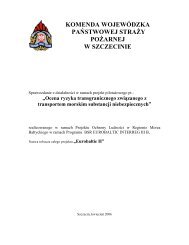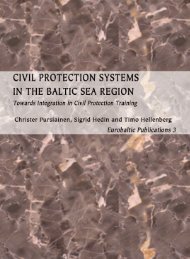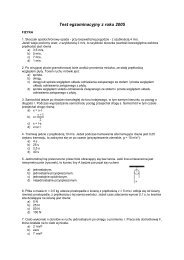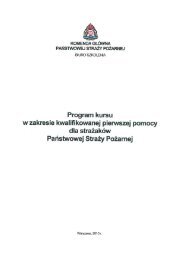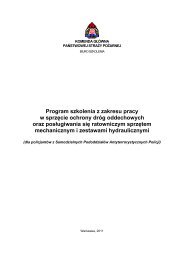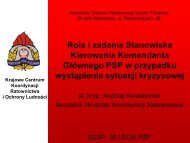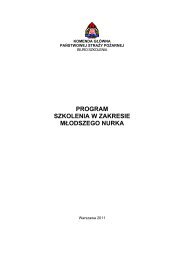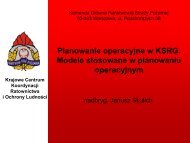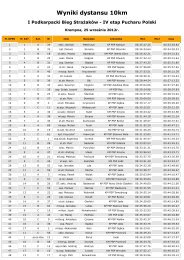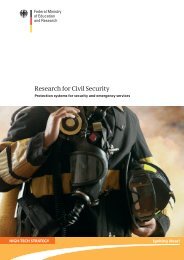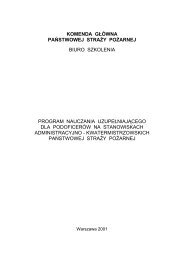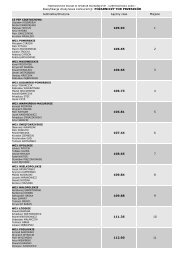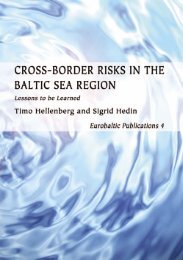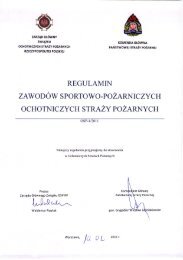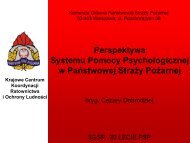Towards a Baltic Sea Region Strategy in Critical ... - Helsinki.fi
Towards a Baltic Sea Region Strategy in Critical ... - Helsinki.fi
Towards a Baltic Sea Region Strategy in Critical ... - Helsinki.fi
Create successful ePaper yourself
Turn your PDF publications into a flip-book with our unique Google optimized e-Paper software.
CHAPTER I: INTRODUCTION<br />
Another territorially extended form of EU-funded cooperation is the INTERREG<br />
programme, where <strong>in</strong> its current form also relevant Northwest Russian regions as<br />
well as Belarus are full-fledged eligible members with the help of the EU’s<br />
European Neighbourhood Policy Instrument (ENPI). 37<br />
This situation might be <strong>in</strong>terpreted as one where the EU is enough to<br />
coord<strong>in</strong>ate the regional activities even <strong>in</strong> the BSR. However, there are plenty of<br />
non-EU regional cooperation forms, which all are reflect<strong>in</strong>g to real needs and <strong>in</strong><br />
that sense show the opposite. While some of these <strong>in</strong>stitutions have been based on<br />
decades-long traditional Nordic cooperation, most of them were created <strong>in</strong> the<br />
aftermath of the end of the Cold War, and aimed at br<strong>in</strong>g<strong>in</strong>g the ‘West’ and ‘East’<br />
of the BSR together. S<strong>in</strong>ce then, their pro<strong>fi</strong>le has been develop<strong>in</strong>g and chang<strong>in</strong>g,<br />
and even now there is a k<strong>in</strong>d of confusion and search for new roles of the regional<br />
<strong>in</strong>stitutions and networks <strong>in</strong> the midst of grow<strong>in</strong>g overlaps and complexity.<br />
The ma<strong>in</strong> actors are the four territorially organised <strong>in</strong>tergovernmental<br />
councils deal<strong>in</strong>g with several issue areas simultaneously: the Council of the <strong>Baltic</strong><br />
<strong>Sea</strong> States (CBSS), Barents Euro-Atlantic Council (BEAC), Arctic Council (AC),<br />
and Nordic Council of M<strong>in</strong>isters (NCM). Some <strong>in</strong>tergovernmental regional<br />
cooperation is functionally organised as, for <strong>in</strong>stance, the Hels<strong>in</strong>ki Committee<br />
(HELCOM) deal<strong>in</strong>g with mar<strong>in</strong>e environment and maritime safety, the <strong>Baltic</strong> <strong>Sea</strong><br />
<strong>Region</strong> Energy Co-operation (BASREC), and Vision and Strategies for the <strong>Baltic</strong><br />
<strong>Sea</strong> <strong>Region</strong> 2010 (VASAB) <strong>in</strong> the <strong>fi</strong>eld of spatial plann<strong>in</strong>g and development. In<br />
some cases these councils or <strong>in</strong>stitutions <strong>in</strong>clude other than BSR non-EU<br />
countries, as <strong>in</strong> the case of the AC, of which the USA and Canada are members.<br />
The Commission of the EU also participates actively <strong>in</strong> the work of these councils,<br />
as a full member as <strong>in</strong> the case of the CBSS, or as an observer <strong>in</strong> some other cases.<br />
Several other European countries and organizations are usually more or less active<br />
observers <strong>in</strong> the BSR <strong>in</strong>tergovernmental bodies. The different regional<br />
organizations tend also to be of<strong>fi</strong>cial observers or strategic partners of each other.<br />
The parliamentary level of this regional cooperation is the <strong>Baltic</strong> <strong>Sea</strong><br />
Parliamentary Conference, be<strong>in</strong>g a forum for national and regional parliaments.<br />
The most <strong>in</strong>tegrated and developed regional cooperation forums, both <strong>in</strong><br />
terms of organisational and f<strong>in</strong>ancial resources as well as policy programmes, are<br />
however founded around traditional Nordic cooperation, such as the NCM and its<br />
parliamentary counterpart Nordic Council (NC). Although these organizations<br />
have been open to all k<strong>in</strong>ds of cooperation with the ‘outsiders’ and have signalled<br />
this <strong>in</strong>clusive strategy by establish<strong>in</strong>g <strong>in</strong>formation and coord<strong>in</strong>ation of<strong>fi</strong>ces <strong>in</strong><br />
Northwest Russia and the <strong>Baltic</strong> States and cooperat<strong>in</strong>g closely with a wide range<br />
of other actors, they so far have decided not to endanger this very well established<br />
cooperation by tak<strong>in</strong>g, for <strong>in</strong>stance, the three <strong>Baltic</strong> States as members of this<br />
Nordic ‘family’. Thus, Nordic cooperation is that tak<strong>in</strong>g place between Denmark,<br />
F<strong>in</strong>land, Iceland, Norway and Sweden.<br />
In any case, this tradition of Nordic cooperation has led to the fact that the<br />
three <strong>Baltic</strong> countries of Estonia, Latvia and Lithuania, have established their own<br />
37<br />
Concern<strong>in</strong>g Russia’s participation <strong>in</strong> regional EU-funded cooperation, the current<br />
ENPI/INTERREG IV system for 2007-2013 replaced the rather complicated system of TACIS<br />
programme, the former EU fund<strong>in</strong>g source for <strong>in</strong>volv<strong>in</strong>g Russia, which was dif<strong>fi</strong>cult to coord<strong>in</strong>ate<br />
with the INTERREG priorities and fund<strong>in</strong>g.<br />
NORDREGIO REPORT 2007:5 49



